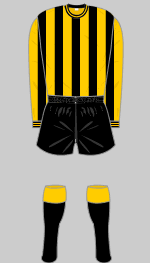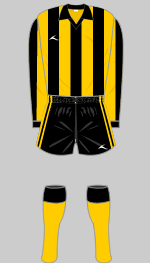


Berwick
Rangers
Formed 1884
Elected to Scottish C Division (North & East) 1951. Relegated to the Lowlands League 2019.
Kit History
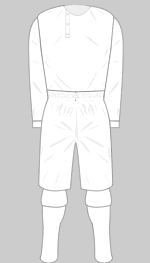
1884-1885 r
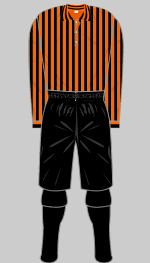
1885-1890 r
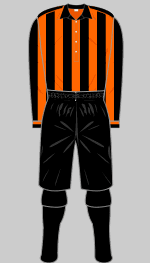
1890-1900 l r
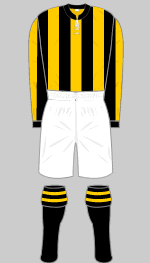
1908-1912 l
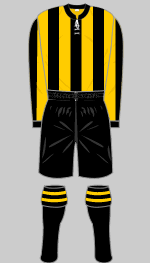
1912-1913 q

1919-1920 l
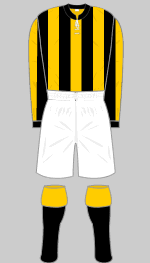
1927-1928 l
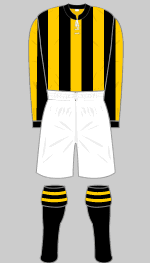
1931-1933 l
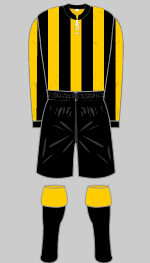
1946-1947 l
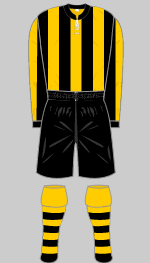
1947-1948 l
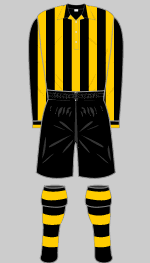
1950-1951 l
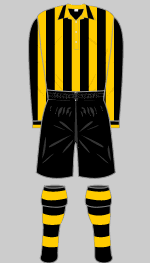
1951-1953 l
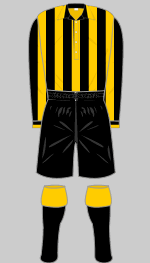
1953-1954 l w
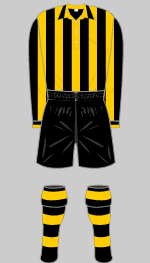
1955-1958 l
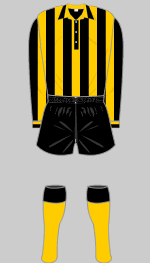
1959-1960 p
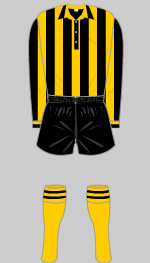
1960-1961 l
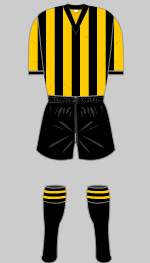
1961-1963 l
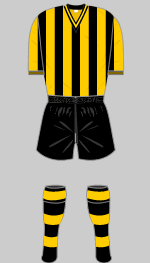
1963-1964 l
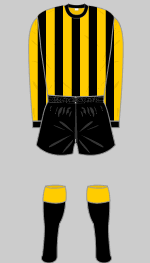
1964-1965 l
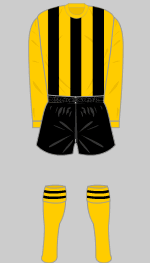
1967-1973 l w
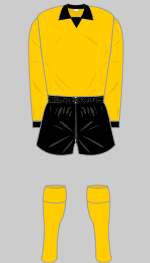
1973-1977 i l
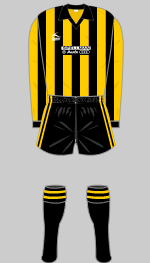
1978-1979 k u
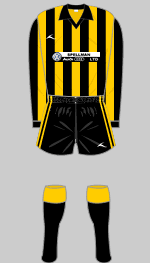
1979-1980 d k o
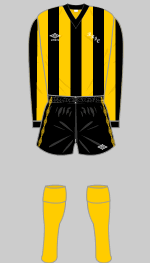
1980-1981 k w
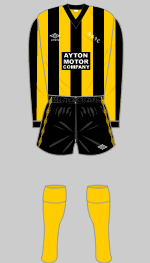
1981-1983 l o
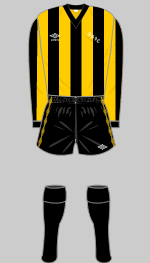
1983-1984 x
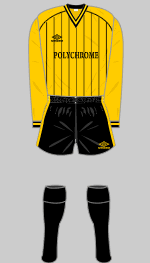
1984-1985 a
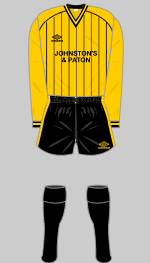
1985-1986 a i m
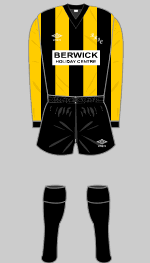
1986-1987 a m
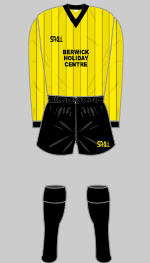
1987-1988 a

1988-1989 o
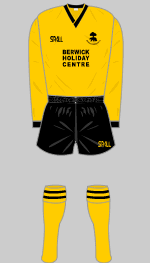
1989-1990 a
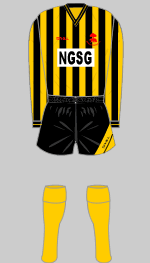
1990-1991 a t
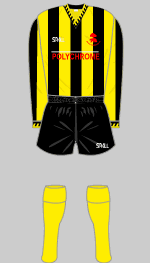
1991-1992 a s
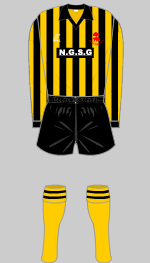
1992-1994 v
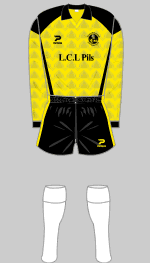
1994-1995 o
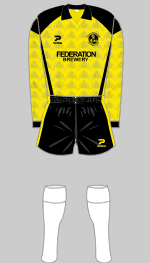
1995-1996 1 h o
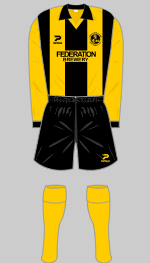
1995-1996 2 h o
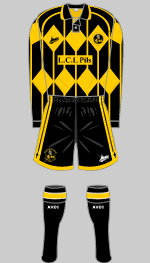
1996-1998 d o
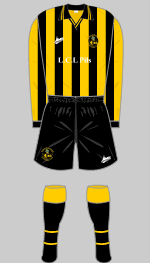
1998-2000 h o
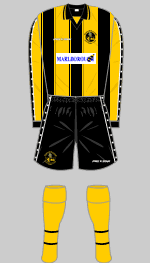
2000-2001 k
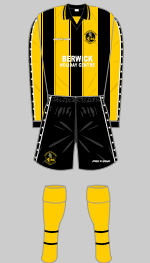
2001-2003 f k
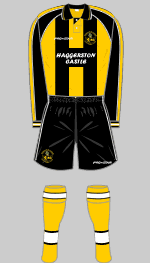
2003-2005 c k
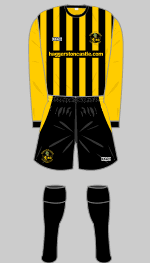
2005-2007 a e k
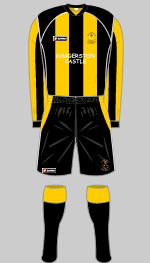
2007-2008 a
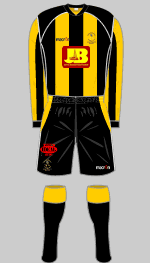
2008-2009 a
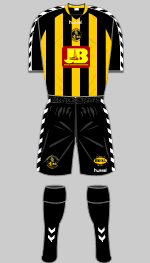
2009-2011 a
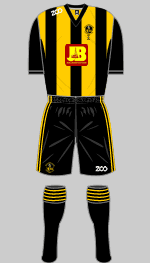
2011-2013 a
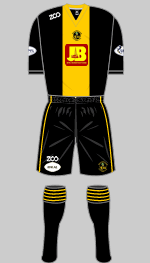
2013-2015 a
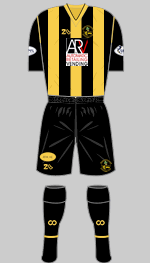
2015-2016 a
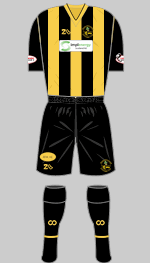
2016-2017 a
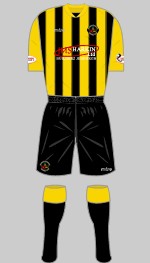
2017-2018 a u
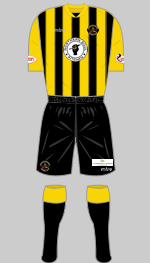
2018-2019 a u
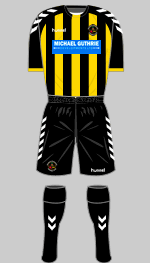
2019-2020 a
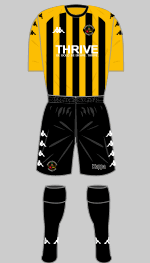
2020-2022 a
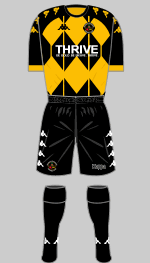
2022-2023 a
Background
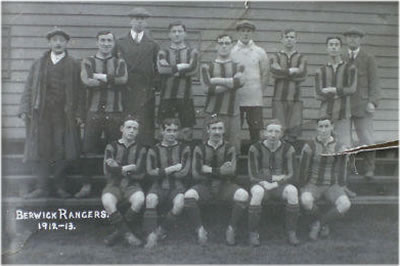 The historic town of Berwick is less than a mile
from the Scottish border and changed hands no fewer than 14 times in
the Anglo-Scottish wars of the 13th to 15th century, when it became
part of England. The town retains many cross-border traditions
and remained technically an independent state until 1836 when it was
formally absorbed into the United Kingdom.
The historic town of Berwick is less than a mile
from the Scottish border and changed hands no fewer than 14 times in
the Anglo-Scottish wars of the 13th to 15th century, when it became
part of England. The town retains many cross-border traditions
and remained technically an independent state until 1836 when it was
formally absorbed into the United Kingdom.
The "Wee Rangers" are one of a handful of clubs that play in a league outside their home country. This situation arises because Berwick is closer to Edinburgh than it is to Newcastle, the nearest English city.
The clubs formation was originally thought to have been in 1881 but in 2012 the club historian, Alan Bell, discovered that the date had been copied down incorrectly and the error was never corrected. Berwick Rangers were in fact formed on 7 January 1884 after a group of railway clerks from Newcastle played a Scottish XI. The new club affiliated to the Northumberland & Durham FA and played their first match against Alnwick FC on Soldier's Flat in Berwick. Thereafter they led a nomadic existence, only settling into Shielfield Park in 1925. In 1954 they moved onto an adjacent site but kept the name of their former ground.
Berwick's original colours were registered as "white jerseys, hose and knickers" although it is doubtful that many of the players would have been able to provide white socks. These were changed in 1885 to "orange and black," which later became "gold and black."
Around 1905 Berwick affiliated to the Scottish FA and entered the Scottish Eastern League followed by the Border Amateur League (1908-09). Recent research by Alick Milne has revealed that the club joined the East of Scotland League immediately after the First World War, a new competition formed to replace the Borders League which had descended into a shambles. They made several attempts to join the North Northumberland League but were rebuffed. It was not until 1951 that they were admitted to Scottish League Division C Division (North & East). This third tier, made up largely of reserve sides, had been created in 1946 and was regionalised in 1949. The division was scrapped in 1955 and Berwick, along with the other non-reserve teams, were placed in an enlarged Division B (renamed Division Two the following season).
The club’s finest moment came in 1967 when they beat Rangers
1-0 at home in a Scottish Cup tie in front of 13,600 fans. In a competition
not noted for its giant-killing tradition, this result sent shock waves
throughout the world. Otherwise the club has had an undistinguished
career, rarely rising above mid-table and when the leagues were reorganised
in 1975, The 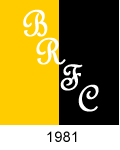 Wee 'Gers were placed in the new Division Two (third tier).
Wee 'Gers were placed in the new Division Two (third tier).
In 1979 the club won their first ever league honour, taking the Second
Division championship to earn promotion to the First Division (then
the second tier of Scottish 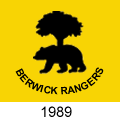 football). The club's initials appeared in 1980-81 in white script sewn directly onto the shirts.
football). The club's initials appeared in 1980-81 in white script sewn directly onto the shirts.
A proper crest appeared in 1989, consisting of a bear and wych elm, a symbol that had been used as the town's coat of arms for many years. The image is a "canting", an heraldic terms for a pun or play on words: in this case "bear" and "wych." The first version was in black on plain gold shirts but when stripes were reintroduced the following season, it 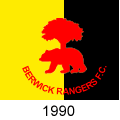 was rendered in red to provide a good contrast.
was rendered in red to provide a good contrast.
In 1994 the decision was taken to create a badge that would be unique to the club. The result included the bear and tree motif along with one lion rampant (representing 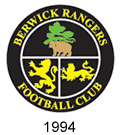 Scotland) and one passant gardant (for England), which rather neatly represents the club's unique status.
Scotland) and one passant gardant (for England), which rather neatly represents the club's unique status.
Berwick survived for two seasons in Division One
before being relegated in last place. They remained at this level until
1997 when they dropped into the Third Division (fourth 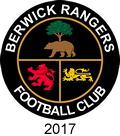 tier). In
2000 they were promoted back into the third level but were back in the basement in 2005. After narrowly missing out on promotion the following season, Rangers won the Third Division championship in 2007, their first title for 28 years.
tier). In
2000 they were promoted back into the third level but were back in the basement in 2005. After narrowly missing out on promotion the following season, Rangers won the Third Division championship in 2007, their first title for 28 years.
Unfortunately the following season was a dismal one and the Wee 'Gers finished bottom having shipped 101 goals. In November 2008 a fan led consortium took control of the club which remained firmly rooted in the lowest tier of Scottish football.
In 2018-19 the team finished a distant last in the Second Division, met Cove Rangers in the play-off final and were heaviy defeated over two legs. They became the second side to be relegated from the SPFL.
Sources
- (a) Berwick Rangers Official Site
- (b) Bairn in Holland
- (c) Brechin City Official Site
- (d) Premier Shirts
- (e) Peterhead Official Site
- (f) Camera Angles
- (g) Voetbalbelgie
- (h) e-bay
- (i) Classic Kits
- (j) Ayr United FC - Images of Sport (Duncan Carmichael 2002)
- (k) SNSpix
- (l) Alick Milne
- (m) Ralph Pomeroy
- (n) Stefan Cooper
- (o) Donald Gellatly (HFK Research Associate)
- (p) The Vision Book of Football Records by Clive Batty (Vision Sports Publishing 2009)
- (q) Keith Ellis
- (r) Pioneers of the North (Paul Joannou & Alan Candlish, Breedon Books 2009)
- (s) Nick Bruzon
- (t) Joe Marchant
- (u) Sytse Korts
- (v) @Club25Football
- (w) Ian McConnel
- (x) Alisdair Gibson
Crests are the property of Berwick Rangers FC.
